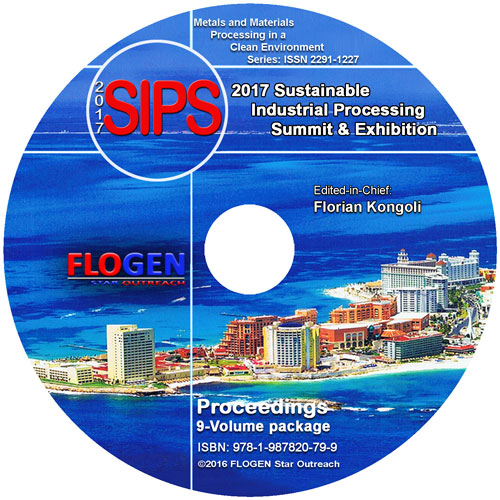2017-Sustainable Industrial Processing Summit
SIPS 2017 Volume 3. Gaune-Escard Intl. Symp. / Molten Salt and Ionic Liquid
| Editors: | Kongoli F, Fehrmann R, Gadzuric S, Gong W, Seddon KR, Malyshev V, Iwata S |
| Publisher: | Flogen Star OUTREACH |
| Publication date: | 19 December 2017 |
| Pages: | 151 pages |
| ISBN: | 978-1-987820-65-2 |
| ISSN: | 2291-1227 (Metals and Materials Processing in a Clean Environment Series) |

CD shopping page
Electrodeposition of Molybdenum Carbide onto the Surfaces of Disperse Dielectric and Semiconductor Materials
Viktor Malyshev1; Dmytro Shakhnin2; Angelina Gab1; Alla Suschenko1; Marcelle Gaune-Escard3;1UNIVERSITY "UKRAINE", Kyiv, Ukraine; 2V.I. VERNADSKY INSTITUTE OF GENERAL AND INORGANIC CHEMISTRY OF THE NATIONAL ACADEMY OF SCIENCES OF UKRAINE, Kyiv, Ukraine; 3AIX-MARSEILLE UNIVERSITE/POLYTECH, CNRS/IUSTI UMR7343, Marseille, France;
Type of Paper: Regular
Id Paper: 98
Topic: 13
Abstract:
The present work is devoted to determining the conditions of carrying out high-temperature electrochemical synthesis (HTES) on surfaces of high-resistance dielectrics (HRD) and semiconductors (SC)in ionic melts. These considerations are based on the thermodynamic analysis of reactions of diamonds, boron nitride, and silicon and boron carbides with ionic melts, on experimental studies of their electrochemical behavior, and on evaluation of the possibility for using HTES in molten systems.
Keywords:
Carbon; Corrosion; Electrochemical; Electrodeposition; Materials; Molybdenum; Oxygen; Refractory; Thermodynamic;References:
[1] Hugh O. PIERSON, Handbook of carbon, graphite, diamonds, and fullerenes, 1994, Elsevier, 419 p.[2] Mark A. PRELAS, Galina POPOVICI, and Louis K. BIGELOW, Handbook of industrial diamonds and diamond films, 1998, Marcel Dekker, Inc., 1180 p.
[3] Mark MUNDAY, Serdar OZBAYRAKTAR, Charles S. J. PICKLES, and Geoffrey SCARSBROOK, Handbook of applied superhard materials, 2017, Springer International Publishing, 900 p.
[4] V. L. Solozhenko and E. Gregoryanz, Synthesis of superhard materials, MATERIALSTODAY, 8 (2005), 44-51
[5] Yuri G. Gogotsi and R. A. Andrievski, Materials science of carbides, nitrides and borides, Nato Science Partnership Subseries 3, 68 (1999), Springer-Science+Bussiness Media B.V., 373 p.
[6] V. V. Malyshev, Kh. B. Kushkov, and V. I. Shapoval, High-Temperature Electrochemical Synthesis of Carbides, Silicides and Borides of VI-A group metals in ionic melts, J. Applied Electrochemistry, 32 (2002), 573-579
[7] Carl L. YAWS, Yaws’ Handbook of Thermodynamic and Physical Properties of Chemical Compounds, 2007, Gulf Publishing Company, 776 p.
[8] Oswald KUBASCHEWSKI, C.B. ALCOCK, and P.J. SPENCER, Metallurgical Thermochemistry, 1993, Pergamon Press, 375 p.
[9] M. W. Chase, J. L. Curnutt, A. T. Hu, H. Prophet, A. N. Syverud, and L. C. Walker, JANAF Thermochemical Tables, 1974 Supplement, J. Phys. Chem. Ref. Data, 3 (1974), 311-480
[10] V. I. Shapoval, I. A. Novoselova, V. V. Malyshev, and Kh. B. Kushkhov, Electrochemical behaviour of diamonds in ionic melts, Electrochimica Acta, 40 (1995), 1031-1035
[11] V. V. Malyshev, I. A. Novoselova, and V. I. Shapoval, High temperature electrochemical synthesis of refractory metal-nonmetal compounds in ionic melts, Molten Salts Bulletin Sels Fondus, 63 (1997), 2-8
[12] V. V. Malyshev and N. N. Uskova, Gal’vanicheskiye pokrytiya karbida molibdena na metallicheskikh, poluprovodnikovykh i dielektricheskikh materialah [Galvanic Coatings of Molybdenum Carbide on Metallic, Semiconductor, and Dielectric Materials], Sverkhtverdye Materialy, 3 (2000), 73-81 (in Russian)